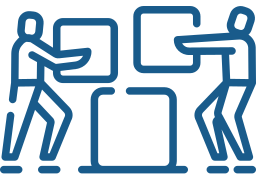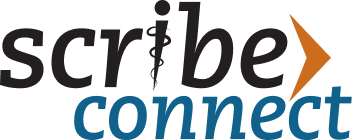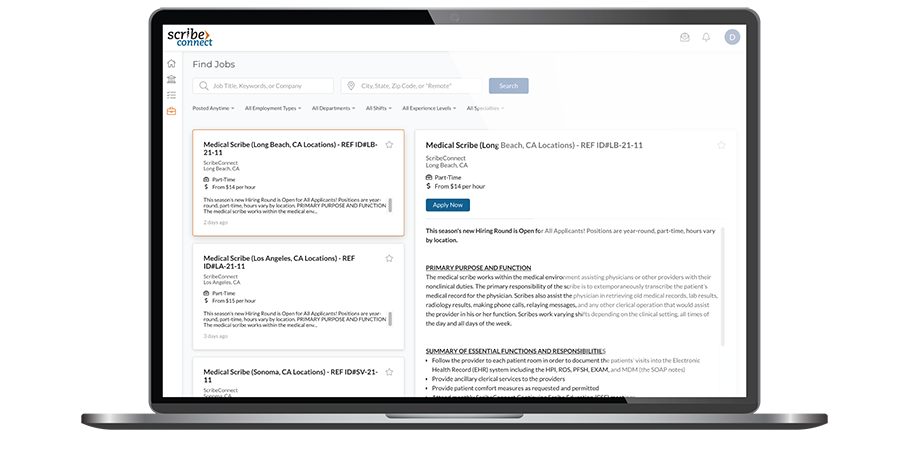Another ScribeConnect Alumni, Andrew J.H. Park, shares his experience and stories
Alumni Spotlight: Andrew J.H. Park is an MD Candidate attending UCSD School of Medicine. Andrew joined ScribeConnect in 2014 as a medical scribe and was promoted to Senior Training Officer in 2015 to assist in the development of our training and educational programs. We had a chance to talk with Andrew about making the most out of your medical scribing experience, preparing for med school, life stuff, and more.
SC: Where and what you are studying – what your next steps are in your career?
Andrew Park: I am currently a second-year medical student at University of California, San Diego School of Medicine. My scribing experiences at Long Beach Memorial have had a huge impact on my career trajectory, and I plan on pursuing residency in emergency medicine. Who knows, maybe I’ll even work at LBM and have a ScribeConnect scribe of my own! They would need to keep up with all of my SmartPhrases, though.
Further down the line, I might pursue a fellowship in Ultrasound medicine, but my big-picture clinical interests in emergency medicine include opioid dependence, addiction, and medical ethics.
SC: What are your short- and long-term goals in medicine?
Andrew Park: Short-term goal: Pass the STEP USMLE. I’ve been denial about this upcoming exam this past Fall quarter, but come Winter term, I’ll have to start sneaking in some extra flash cards while on the elliptical at the gym, or something like that. Just kidding. Or not.
Long-term goals: Become a driving force in the medical humanities, champion awareness for mental illness, depression, and physician burnout, and write a couple books. First year was a difficult year for me in terms of mental health and wellness, and I want to make sure that I can create a nurturing work environment for myself and my peers. I’m heavily involved with the Human Condition, which is our medical school’s literary and arts magazine, and I work with the school to promote wellness events to address and destigmatize mental health and wellness.
SC: What are some things you got from scribing and managing that you have found most helpful on your path so far?
Andrew Park: Learning to work hard and smart. Constantly asking myself, how can I make this system better? For example, take something like SmartPhrases, which are helpful because they provide shortcuts to phrases that I need to use on a daily basis. So, I do the same thing with emails, since Apple has keyboard replacement texts.
Time management. Being comfortable with feeling overwhelmed, because medical school is a constant barrage of information.
The power of candy. Bring Andes Mints to clinic, give them to the nurses, and you have friends for life who will go out of their way to make your experience better.
The language; the language! One of the best takeaways to med school from scribing was the familiarity and ease with all the medical terminology and treatment plans from the ED. It just gives you this baseline of “okay, I got this” that you really need in the first year of med school. That and notes. Because of ScribeConnect, I can write really good notes. In my sleep. Which is sad.
SC: Do you have any words of wisdom for scribes and those in application processes?
Andrew Park: Hmm. I don’t feel like I’m at a position to provide words of wisdom, since I’ve only just got here myself. But if there were things I would tell ‘younger me’ over and over again, it is to enjoy the process: plan ahead for tomorrow, but don’t forget to enjoy today as well. I’m saying this in the hope that I will someday take my own advice. But speaking from my own experience, to any scribe who’s struggling with the med school application process: If you need to take another year off, do it. (I took three years off, applied twice, and accumulated more rejections than I could count). Learn from your failures, but don’t waste them. No one’s dying regret was ever “I wish I got into medical school one year earlier.”
Another observation that I noticed—and this could apply to scribing and any other process of skill acquisition—is that after you reach a certain level of proficiency, your skills start to plateau, and the only way to improve is to focus on the details. Figure out what details matter to you, and stick to them; the small things that other people don’t see. I think this is what keeps the mind stimulated and prevents skill stagnation. As an example, I try to keep a level of interaction with my patients, and I focus on their eye color. With every patient I see, I try to memorize their eye color in the initial encounter. This keeps me accountable: If I don’t remember their eye color later while I’m writing the note, then I didn’t listen enough, didn’t observe enough, and ultimately didn’t pay attention to other details that mattered.
SC: Anything else fun you’ve been doing?
Andrew Park: Outside of medicine, I like to collect wristwatches and rejections, the latter which I store in a mason jar on my bookshelf. On days when my hip and shoulder do not ache, I enjoy surfing and writing flash fiction. I have become increasingly fixated on cooking, which I believe will help train me to deal with stressful situations in the ED, because, you know, the ED is basically like a kitchen.
I work a side hustle as a content editor for a medical school admissions company, which is a fun way for me to pay my experiences forward (as well as pay off my loans).
We love hearing from our medical scribe alumni. Send your story or updates to hr@scribeconnect.com.
 In-House Scribe SolutionsTake control of your medical scribe program
In-House Scribe SolutionsTake control of your medical scribe program Contracted Full-Service Scribe SolutionsWe Build a Turn-Key Scribe Program For Your Organization
Contracted Full-Service Scribe SolutionsWe Build a Turn-Key Scribe Program For Your Organization In-House Scribe SolutionsTake control of your medical scribe program
In-House Scribe SolutionsTake control of your medical scribe program In-house Scribe Program OverviewWith the ScribeConnect Scribe Management Platform you can have the best part of medical scribe’s EHR documentation help right in your organization.
In-house Scribe Program OverviewWith the ScribeConnect Scribe Management Platform you can have the best part of medical scribe’s EHR documentation help right in your organization. Overview and Key featuresMedical scribe management doesn’t have to be difficult, no matter what every other scribe providers tell you. The only SaaS medical scribe management platform is here for you.
Overview and Key featuresMedical scribe management doesn’t have to be difficult, no matter what every other scribe providers tell you. The only SaaS medical scribe management platform is here for you. for Healthcare OrganizationsFrom large hospital systems across urban centers, to small clinics operating in rural areas, our platform is designed to scale, grown, and accommodate your medical scribing needs.
for Healthcare OrganizationsFrom large hospital systems across urban centers, to small clinics operating in rural areas, our platform is designed to scale, grown, and accommodate your medical scribing needs. for Education InstitutesLooking for ways to offer your pre-med and pre-PA students more value? Or have a scribe training curriculum already in place and looking for a wider medical student audience? We can help.
for Education InstitutesLooking for ways to offer your pre-med and pre-PA students more value? Or have a scribe training curriculum already in place and looking for a wider medical student audience? We can help. for Scribe ApplicantsApply to medical scribe job openings across the country, and join a community of thousands of medical scribes. Access our comprehensive scribe training courses and more!
for Scribe ApplicantsApply to medical scribe job openings across the country, and join a community of thousands of medical scribes. Access our comprehensive scribe training courses and more! How to use our PlatformOur platform is simple to use, with robust features and powerful tools. Learn how to get the most out of our SaaS based platform with tips and tricks.
How to use our PlatformOur platform is simple to use, with robust features and powerful tools. Learn how to get the most out of our SaaS based platform with tips and tricks. Contracted Full-Service Scribe SolutionsWe Build a Turn-Key Scribe Program For Your Organization
Contracted Full-Service Scribe SolutionsWe Build a Turn-Key Scribe Program For Your Organization Full-Service Scribe Program OverviewWe hire, train, and manage your medical scribes so you don't have to.
Full-Service Scribe Program OverviewWe hire, train, and manage your medical scribes so you don't have to. Any provider, any time, anywhere.ScribeConnect has provided full-service, turn-key medical scribe programs for healthcare organizations large and small.
Any provider, any time, anywhere.ScribeConnect has provided full-service, turn-key medical scribe programs for healthcare organizations large and small. Frequently Asked QuestionsHere are some frequently asked questions that may help you decide whether or not a medical scribe program is right for you.
Frequently Asked QuestionsHere are some frequently asked questions that may help you decide whether or not a medical scribe program is right for you. Healthcare OrganizationsOur platform empowers your organization with intuitive tools to recruit, track applicants, train & certify scribes, and manage teams. Build and grow a strong and dynamic scribe program of any size with confidence.
Healthcare OrganizationsOur platform empowers your organization with intuitive tools to recruit, track applicants, train & certify scribes, and manage teams. Build and grow a strong and dynamic scribe program of any size with confidence. Healthcare OrganizationsOur platform empowers your organization with intuitive tools to recruit, track applicants, train & certify scribes, and manage teams. Build and grow a strong and dynamic scribe program of any size with confidence.
Healthcare OrganizationsOur platform empowers your organization with intuitive tools to recruit, track applicants, train & certify scribes, and manage teams. Build and grow a strong and dynamic scribe program of any size with confidence. Solutions For Your Healthcare OrganizationEase your documentation load, keep your providers happy, and improve your revenue cycle with ScribeConnect Medical Scribe Solutions. Designed for Healthcare Networks, Clinics, Hospitals, Emergency Departments, and Practice Management Groups
Solutions For Your Healthcare OrganizationEase your documentation load, keep your providers happy, and improve your revenue cycle with ScribeConnect Medical Scribe Solutions. Designed for Healthcare Networks, Clinics, Hospitals, Emergency Departments, and Practice Management Groups Post A Job & Track ApplicantsWhether you're hiring one scribe, or an entire team or teams of scribes, we have America's largest dedicated medical scribe job board. Post, manage, and HIRE the most qualified scribes.
Post A Job & Track ApplicantsWhether you're hiring one scribe, or an entire team or teams of scribes, we have America's largest dedicated medical scribe job board. Post, manage, and HIRE the most qualified scribes. Course CatalogOur industry-leading, academically-based, professional Medical Scribe Training Courses (MSTCs) are designed for a range of topics, from general and continuing scribe training to in-depth specialty-specific courses.
Course CatalogOur industry-leading, academically-based, professional Medical Scribe Training Courses (MSTCs) are designed for a range of topics, from general and continuing scribe training to in-depth specialty-specific courses. Educational InstitutionsFrom enrollment to alumni services, ScribeConnect’s platform can be your powerhouse medical scribe training and certification program.
Educational InstitutionsFrom enrollment to alumni services, ScribeConnect’s platform can be your powerhouse medical scribe training and certification program. Educational InstitutionsFrom enrollment to alumni services, ScribeConnect’s platform can be your powerhouse medical scribe training and certification program.
Educational InstitutionsFrom enrollment to alumni services, ScribeConnect’s platform can be your powerhouse medical scribe training and certification program. Academic PartnershipsSee what a partnership with ScribeConnect can do for your department and institution.
Academic PartnershipsSee what a partnership with ScribeConnect can do for your department and institution. Learn About Our Collegiate CoursesLearn about our academically-rigorous certificate courses that have been developed for the college student and how they can complement & expand your program's offerings.
Learn About Our Collegiate CoursesLearn about our academically-rigorous certificate courses that have been developed for the college student and how they can complement & expand your program's offerings. Financial Partnership ProgramSee how our financial partnership program can provide your institution with a new income stream in an extremely fast-growing, emerging, and competitive industry.
Financial Partnership ProgramSee how our financial partnership program can provide your institution with a new income stream in an extremely fast-growing, emerging, and competitive industry. ScribesAspiring scribes begin their education and path to employment here, while experienced scribes can learn valuable new skills and specialty-specific knowledge to take it to the next level.
ScribesAspiring scribes begin their education and path to employment here, while experienced scribes can learn valuable new skills and specialty-specific knowledge to take it to the next level. ScribesAspiring scribes begin their education and path to employment here, while experienced scribes can learn valuable new skills and specialty-specific knowledge to take it to the next level.
ScribesAspiring scribes begin their education and path to employment here, while experienced scribes can learn valuable new skills and specialty-specific knowledge to take it to the next level. What We Can Do For YOU?ScribeConnect has built a rich legacy of helping pre-medical professionals launch their careers. Now we're providing more powerful tools than ever before to help you win. See how.
What We Can Do For YOU?ScribeConnect has built a rich legacy of helping pre-medical professionals launch their careers. Now we're providing more powerful tools than ever before to help you win. See how. Find JobsSearch our job board and apply to jobs in your area. Apply to work directly with ScribeConnect at one of our locations or apply directly to one of our partners.
Find JobsSearch our job board and apply to jobs in your area. Apply to work directly with ScribeConnect at one of our locations or apply directly to one of our partners. Course CatalogPosition yourself above the competition when you get certified through our rigorous Medical Scribe Training Courses (MSTCs). You'll be prepared and equipped to work as a scribe in the medical setting of your choice.
Course CatalogPosition yourself above the competition when you get certified through our rigorous Medical Scribe Training Courses (MSTCs). You'll be prepared and equipped to work as a scribe in the medical setting of your choice.




